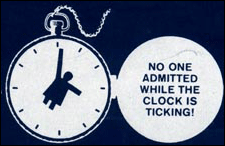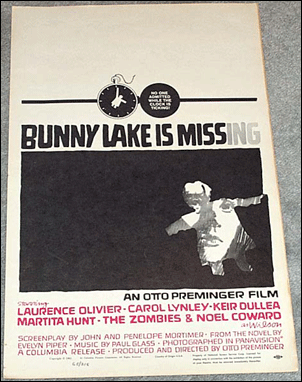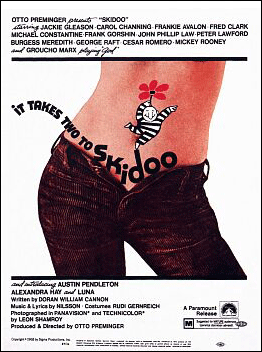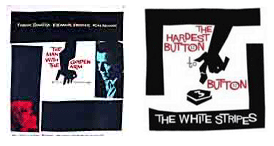Have you ever stumbled upon references to someone or something so frequently that you feel like you’re unable to avoid it / them? I don’t mean in the ‘hype’ sort of way, where you’re bombarded by advertising – I mean the sort of situation where you keep finding tangential references to something when looking for something else. This is my problem with film director Otto Preminger. He haunts me.
Well, maybe not haunts me, but he seems to come up way more than someone I know absolutely nothing about should. So I decided to find out a bit about Otto Preminger, via the unrelated paths that have led me to him. I’m now well aware that there are other things that Preminger is better known for – he was nominated for an Academy Award for directing ‘Anatomy of a Murder’ in 1959, and famously turned down the opportunity to direct ‘The Godfather’ – but I’m more interested in following these unrelated tangents.
The Zombies
My first exposure to Otto Preminger came with the Zombies box set: Zombie Heaven. The Zombies appeared in the 1967 Preminger film ‘Bunny Lake is Missing,’ and reworked the lyrics to one of their songs (‘Just Out of Reach’) for use as throw-away advertising. The song-by-song liner notes for the boxset are relatively brief when addressing this collaboration, noting that Preminger was present in the Studio for the session, and offering the following bit of useless trivia:
“I remember doing that with Otto Preminger, and him saying “You can’t say ‘Clock,’ you have to say ‘clarrk,’ because Americans won’t understand it.” – Chris White
I’ve posted the lyrics to ‘Come on Time’ below. If it seems a bit overly-obsessed with the ettiquette of theatre arrival, it’s because this was used as a marketing gimmick for the film – moviegoers were not to be admitted after a certain time. I’ve also posted an MP3 combining ‘Just Out of Reach’ and ‘Come on Time’ into one file, so you can listen along.
The Zombies – ‘Just Out of Reach / Come on Time’
From: Zombie Heaven (1997)
Come on time!Come on time for the show
The clock’ll tell you when to go
While the show’s on can you get in? (No!)Come on time!
Otto Preminger Presents!
‘Bunny Lake is Missing’ – what suspense
Lawrence Olivier is immense!Come on time!
Oh Yeah, The Zombies are there
(Thats us!) That’s Me / That’s Him / That’s He
We wanna go on record as sayin’
“How Great can a movie be?”Carol Lynley is keen as a knife
Keir Dullea’ll give you the time of your life
Come with your girlfriend, or come with your wife butCome on time!
(typically insane Rod Argent organ solo)
Oh Yeah, The Zombies are there
(Oh Yeah!) That’s us / That’s right / That’s paul
We wanna go on record as sayin’“You’re sure to have a ball.”
Come on time for the show
The clock’ll tell you when to go
While the show’s on can you get in? (No!)Come on time!
Please come on time.

If you listen closely between the two songs on the mp3, you can hear singer Colin Blunstone being quizzed on his pronunciation of ‘Clock’ before beginning the final vocal take:
Unknown: Let’s hear it!
Blunstone: Clarrk!
For some reason, the sasstastic delivery of the line “Otto Preminger… Presents!” in ‘Come on Time ‘ has stuck with me since I first heard it, so when I started seeing Preminger mentioned elsewhere it was the first thing I thought of.

There’s a webpage dedicated to ‘Bunny Lake is Missing’ (“The best movie you’ll never see.”) here. It offers a nice summary of the plot:
“Based on a novel by Marryam Modell (using the pen-name Evelyn Piper), Bunny Lake Is Missing is a rarely seen 1965 thriller directed by the acclaimed Otto Preminger. He was acknowledged as the first “indie” director and worked with sometimes controversial topics. His “Man With The Golden Arm” of 1956 starring Frank Sinatra was the first movie to be given an “X” certificate in the UK due to it’s subject matter of drug use by the main character. Bunny Lake is set in London where an American single mother (played by Carol Lynley) has arrived in town with her daughter. The basic premise of the film (without giving anything away) is that we never see her child (named Bunny Lake), even when she is supposedly dropped off at a nursery school, and when she goes missing we are left in some doubt as to whether she existed to start with. On a desperate search for the child, Lynley’s character comes across some truly weird characters on her travels around a bleak London. Shot entirely in black and white (and apparently less than 100 shots), the movie has a surreal feel to it at times with Preminger’s Hitchcock-like approach adding to the tension. A well-chosen cast including Laurence Olivier, Noel Coward and Keir Dullea strengthen what would otherwise still be a great movie. Olivier’s Police inspector suspects that the mother might not letting him know everything and so the movie builds towards a clever climax. “
The chronology included with the boxset reveals that the Zombies shot for two full days on a soundstage with Preminger. The final cut of the film inludes them for just a few seconds – seen on a television screen in the background, behind actors delivering dialogue. A short description of the scene in question can be found here:
“A British band by the name of The Zombies contributed a few tracks to the movie, one of which features in a way that is hard to describe but I’ll try anyway. Laurence Olivier’s character is standing in a pub talking when for no specific plot reason the camera pans up to a television above the bar where we then watch the band perform a track before the camera pans back to Olivier again. Whether or not this was an early attempt at cross-promotion I don’t know but The Zombies were actually given a “starring” credit on most of the posters for the movie. “
‘Bunny Lake is Missing has never been available on VHS or DVD. If Mr. internet is to be believed it last aired on television sometime in 2000. You can sign up here to be notified by Amazon if it’s ever offered. Also of note is the fact that Resse Witherspoon is actively developing a remake of this movie in which she plans to star. I can’t WAIT to see who takes the place of the Zombies.
Harry Nilsson
For the past year or so I’ve been on a big Harry Nilsson kick. Nilsson is the guy behind ‘The Point,’ the ‘Popeye’ soundtrack, and several other ridiculously great pop songs. It was recently pointed out to me by one Mr. Zachary ‘Jack’ Curd that Nilsson had done a soundtrack in which he sang the credits. Needless to say I had to hear this.
I soon determined that the song came from an Ill-fated 1965 film called ‘Skidoo,’ directed by… Otto Preminger. Looking back at the lyrics to the Zombies song, it seems that Preminger made a habit of getting his films’ credits set to music (If you know of any other examples, please let me know). The really great thing about the Nilsson-penned ‘Cast & Crew’ is that it appears as the OPENING credits and encompasses ALL credits, including such benign information as the film stock, the legal disclaimers, and so on.
Some choice bits of the lyrics:
“Music and Lyrics by nilsson who also played a tower guard…” [Crediting the song to himself within the song! I guess that’s not all that uncommon, actually. Nevermind.]
“Photgraphed in panovision and technicolor…”
“Copyright MCMLXVIII by Sigma productions incorporated, the reciept’s on file…”
“The story, the charcters, and the incidents are fictitious, ho hum, etc. etc…”
If you know of any other instances of the credits to a film being sung, I need to know about it.
In an appropriately bizarre move, Nilsson performed the song live during one of his rare television appearances, on “Playboy After Dark” in 1968. Nilsson had this to say about the song:
“It just happens that in writing that particular thing it was really a lot of work so it stayed with me longer because it was four minutes of peoples’ names and their jobs. So it was trying to write a melody to encompass the names and the jobs to make it come out rhythmically and in rhyme. You know, it was a very difficult thing so you spend a lot of time with it. And I became very familar with the cast and crew of the movie.”
Harry also performed “Good Old Desk” on the show and told Hugh Hefner that the meaning of the song was in its initials – “GOD.” Nilsson later said:
“I bullshitted him. I thought it was funny.”
You can download an MP3 of Nilsson’s ‘The Cast and Crew’ below:
Harry Nilsson – ‘The Cast and Crew’
From: Skidoo / The Point! (2000)
Skidoo was Groucho Marx’s last film (He plays God). It looks as though it’s become a bit of a cult classic in the ‘It’s so bad you have to see it’ sort of way. Skimming the IMDB listing yields this choice user review:
“I went to see this after hearing a lot of hype about how it was one of the most unimaginable oddities in all movie-dom…and anticipation like that can often ruin a movie for you. I had, after all, read all the comments here on IMDB and already knew that Groucho Marx was going to play God, Carol Channing was going to take her clothes off, and Harry Nilsson was going to sing the entire credits. You’d think that the shock of the viewing experience might be compromised by that kind of foreknowledge.”
“But no. Hearing that this movie exists is one thing, but the true surreality of its existence can only really be appreciated once you’ve actually SEEN all these actors actually performing this script, putting in various degrees of professional effort to bring to life the tale of ‘Skidoo.’ The credit song is doubly stunning in that it calls our attention to the names of all the many REAL LIVE PEOPLE who for some reason collaborated to produce this film. To be told that there is a movie in which Austin Pendleton talks Jackie Gleason through an acid trip is merely amusing; but to actually witness Gleason’s bulging eyes as he reacts to a hallucination of Groucho’s head sprouting from a giant screw – for this there is no substitute.”
“Read all the other comments, read anything you can find on this monstrosity, and you’ll still be only half-prepared for what you’re going to see. The only two other films I can think of that so exceeded even their own outrageous hype were Blood Freak and Godmonster of Indian Flats. But, hey, those were low-budget obscurities. Skidoo was a HUGE production – and, unfortunately, I can’t imagine this is EVER going to be released on DVD, VHS, CD, cassette, or eight-track, because I can’t imagine the Preminger estate wanting any trace of Skidoo to surface ever again.”
“Carol Channing in bra and tights. Groucho Marx on a wood screw. Dancing garbage cans. Sure, sure, sure. You’ve heard the stories. But there’s sooooo much more….”

This smoking Gun document, which details the FBI’s efforts to have a reference to the bureau removed from ‘Skiddo,’ describes Preminger as follows:
“Preminger was involved in numerous communist front activities, particularly during the 1940’s. He has been described by informants as having communist sympathies. In 1960, considerable publicity was afforded the fact that he had hired Dalton Trumbo, a screenwriter whose name had appeared on the so-called Hollywood “Black list.”
The rest of the document details Preminger’s refusal to remove the reference:
“Mr. Preminger adamantly said that he would not delete the FBI reference from the sequence and would not substitute other material in lieu of the FBI reference. He said he felt that the FBI should see the humor in the sequence and should not view it as a damaging or ridiculing portrayal.”
“Mr. Preminger said he is aware of the provisions of public law 670, that he has had the law researched, and that he is of the firm belief the public law is not applicable to the present situation. Mr. Preminger suggested he feels so certain that public law 670 does not apply to his portrayal of the FBI in the motion picture “Skidoo” that he would welcome a test of the law in this case if the Department of Justice was so inclined.”
It turns out Preminger was pretty outspoken on fighting censorship (Among other things – on Marilyn Monroe, whom he directed: “A vacuum with nipples.”). Speaking at the Toronto film theatre in 1970, Preminger had this to say on the topic:
“I originally was born in Vienna, and lived there a long time. In the United States, one of the most precious rights we have is the right of free expression. I have had trouble with censorship, with the small movie, THE MOON IS BLUE, because in 1953 people objected to the word “virgin,” which is hard to believe. I could have easily made a few cuts and compromised, but I feel that in our own fields, as motion picture directors, newspapermen, writers, whatever we are, we have not only the right, but the duty to defend this right of free expression; because if this right deteriorates, that is the first step to dictatorship, to totalitarian government, and no totalitarian government, whether on the Right or on the Left, could ever exist with its citizens having the right to speak freely. I think it is very important for us to fight for this right and that is why I have always fought censorship and won. There is no censorship in the United States. I hope it will stay like this. That is my answer to questions about censorship. My views have never changed.”
It looks like you can buy a copy of Skiddo on DVD here ($20), along with all sorts of other rare video, such as a 5 1/2 hour workprint of ‘Apocalypse Now’; The Dirk Diggler Story – a precursor to Boogie Nights filmed by P.T. Anderson at age 17; and… er… Bunny Lake is Missing. So ignore what I said about it not being available anywhere. I don’t feel like going back and revising that paragraph.
Saul Bass
Growing up with an unhealthy interest in neo-surf vinyl, I became well acquainted with the (really, really great) design work of Art Chantry. Chantry was the designer of choice for bands on Estrus records, an early ally of Sci-fi surf monoliths Man… or Astroman?, and he recently released a retrospective of his work titled ‘Some People Can’t Surf.’
You can browse a gallery of his poster design here, and read a great rotodesign interview with him here.
As I learned a bit more about design I also became obsessed with the work of Saul Bass, a graphic designer who was an obvious influence on Chantry.
The font that this version of kempa.com sports is an amalgamation of Bass typography called ‘Hitchcock’ – available in both mac and PC incarnations at saulbass.net. The site is also home to quicktime movies of some of Bass’s best known title sequences and a gallery of his print work. Bass has done posters that probably know without knowing that they’re his work – West Side Story, Alfred Hitchcock’s ‘Vertigo,’ and ‘The Man with the Golden Arm’ (Recently Co-opted by the White Stripes for their ‘Hardest Button to Button’ single) are all good examples. The Man With the Golden Arm is an Otto Preminger film – it turns out Bass worked on several Preminger productions.

At any rate, one morning about a year ago, I was flipping through a stack of LP’s at a library sale and I found a soundtrack bearing the distinct Saul Bass visual signature. It was for a film called the Cardinal, and I ended up buying the LP just for the cover. A few months later, I ended up ‘borrowing’ the ‘THE’ for a T-shirt design. After scanning the cover and opening the results up in photoshop, I found myself cropping out the name of… Otto Preminger.
There’s a gallery of the posters for Preminger’s films here. It’s interesting to look at how the typographical idea was maintained across languages:

So: The Zombies, Saul Bass, Harry Nilsson, free speech – I suppose Otto Preminger is the human embodiment of a convergence of my tastes. I always sucked at writing conclusions.